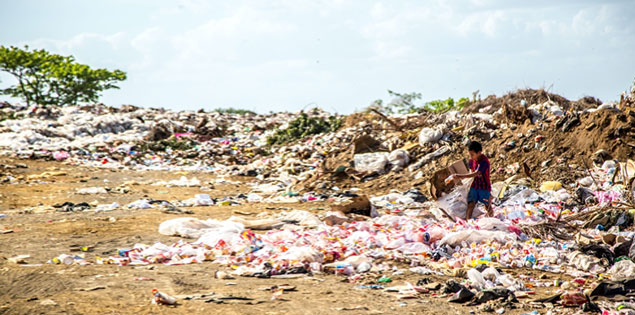On an average, the urban Indian population generates 1,43,449 metric tonnes of municipal solid waste (MSW) daily. MSW includes biodegradable waste, recyclable items and reject waste that is collected by municipalities. On a yearly basis, 62 million tonnes of MSW are generated in India. Of this, only 22-28% is treated and the rest ends up in landfills. Waste generation in India is estimated to rise to 165 million tonnes, more than double the current figure, by 2030. Consequently, the land required for the disposal of this increased number will also rise from 1240 hectares to 66,000 hectares, leading to a larger number of GHG emissions, landfill fires, health problems and pollution.
Waste recovery is a large-scale operation that requires high-functioning machinery, labor power, transport, and logistics to deal with the gigantic numbers of waste. While India has always had a robust recycling industry, populated by informal itinerant stakeholders like ragpickers, raddiwallas, kabadiwallas (waste buyers) and scrap dealers, recycling as a necessity to curb waste crisis never picked up in India. Until recently, organized recycling firms that seek to formalize the sector were few due to a heavy dearth of funds. While the Indian Constitution has made a provision for collection of waste by Urban Local Bodies (ULBs), the process is ineffective and hindered by inadequate infrastructure, lack of institutional capacity, lack of funding, and land scarcity.
However, as the COVID-19 pandemic tested the resilience of most industries, the waste management industry remained financially agile, bound by government regulations and municipal contracts, and with household waste on the rise due to work-from-home. What has also aided this insulation from recession is the Extended Producers’ Responsibility (EPR) for plastic waste, released in 2016.
EPR aims to propel recovery and recycling measures to curb plastic pollution and achieve SDG 12 of ‘Responsible Production and Consumption’. This is essential, given that plastic waste accounts for 5-6% of the total MSW generated in India annually. With the EPR mandate in place, manufacturers in India must account for the plastic they have used in their production, supply, and distribution. The Rules have also provided mechanisms to fulfill the EPR – manufacturers can pay a fee to a central corpus for managing their waste, they can buy credits that offset their plastic via recycling, or they can pay certain organizations to manage collection and recycling.
Public finance and voluntary contributions are not likely to meet the scale needed to initiate circular economy by circulating the waste generated. Private equity investments herald opportunities to promote circularity by investing in ventures that are creating an impact environmentally, socially, and economically.
With climate change adaptation and environmental impact becoming a growing concern for investors, it is no surprise that recycling organizations have received an impetus from impact investors. Investment platforms like The Conduit Connect, Plug and Play, KKR, Upaya Social Ventures have recognized the financial viability as well as the potential for climate adaptation in Indian waste management through successful EPR models of ReCircle, Saahas Zero Waste, Ramky Enviro Engineers, who are servicing leading companies like HUL, ITC, Godrej, Nestle, HCCB that fall under EPR regulations. Last year, the Circulate Capital Ocean Fund – through partnerships with Unilever, The Coca-Cola Company, PepsiCo, etc – invested USD 19 million in four leading Indian plastic waste management companies in an effort to fight ocean plastics.
Circular economy holds immense potential for mitigating climate change. For instance, Veolia generated half of its waste management revenues, USD 5.6 billion, through circular activities like recycling in 2018. Consequently, the circular economy financing market is on the rise, and waste management is at the forefront of it. One of the eight areas of focus for Alphabet’s USD 5.75 billion sustainability bonds is circular economy to improve the recovery of waste materials. Since 2018, EIB has been allocating Sustainability Awareness Bonds to activities like recycling, waste prevention to cover the spectrum of circular economy.
The Indian waste management industry is ripe for investments owing to its scale, growing number of organized recycling companies, and the frequently updating EPR policy. Aided by the EPR promise of promotion of circularity, the aftermath of the pandemic can form a firm base for circular economy by converting waste into resources through recycling.
https://plastics.ellenmacarthurfoundation.org/epr#Statement
https://www.adelphi.de/en/publication/feasibility-study-waste-nama-india
https://mohua.gov.in/upload/uploadfiles/files/Part2.pdf
https://www.ibef.org/industry/fmcg.aspx
https://www.linkedin.com/pulse/investing-transform-indias-recycling-circular-economy-rob-kaplan/
https://abc.xyz/investor/static/pdf/SustainabilityBondFramework2020.pdf

